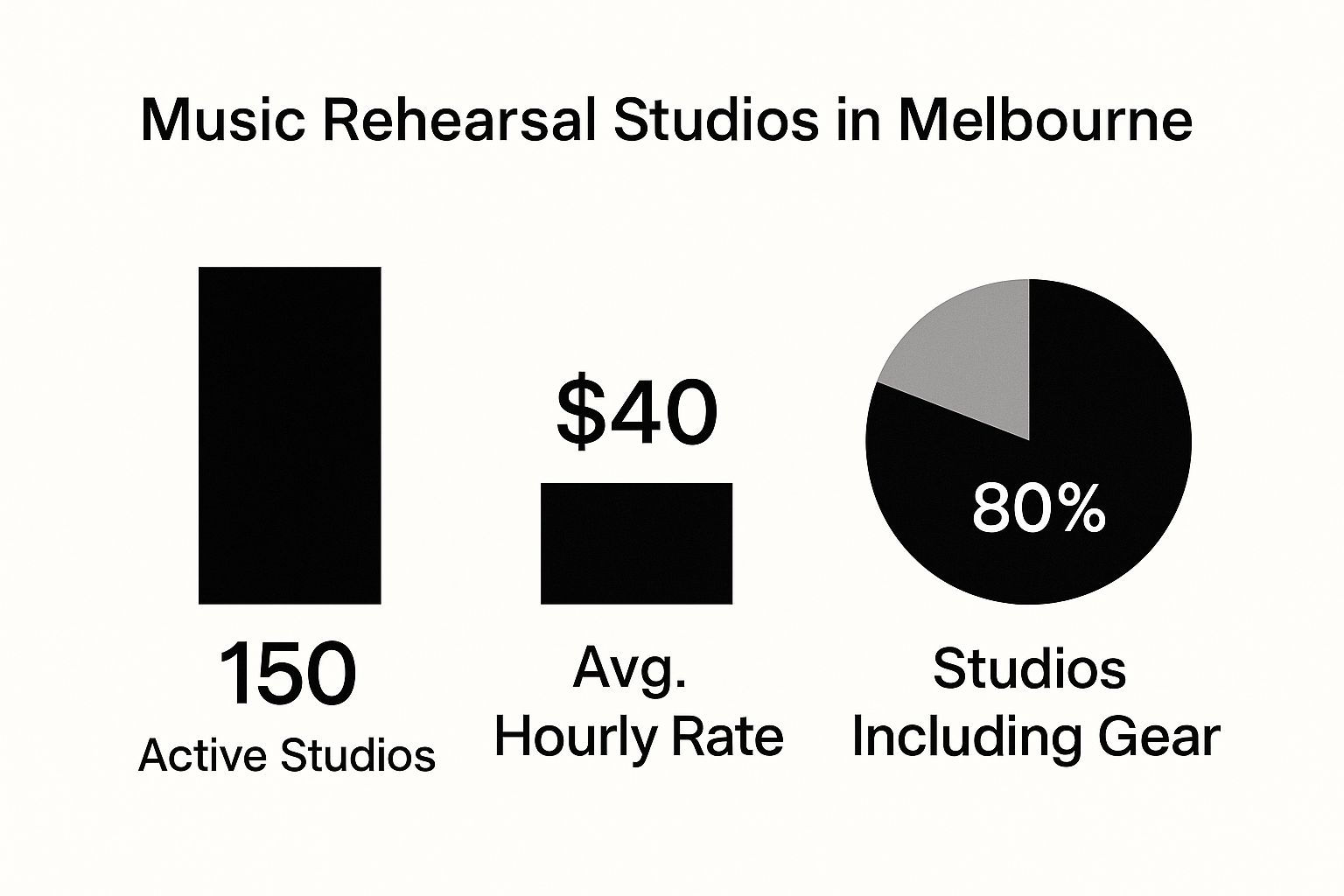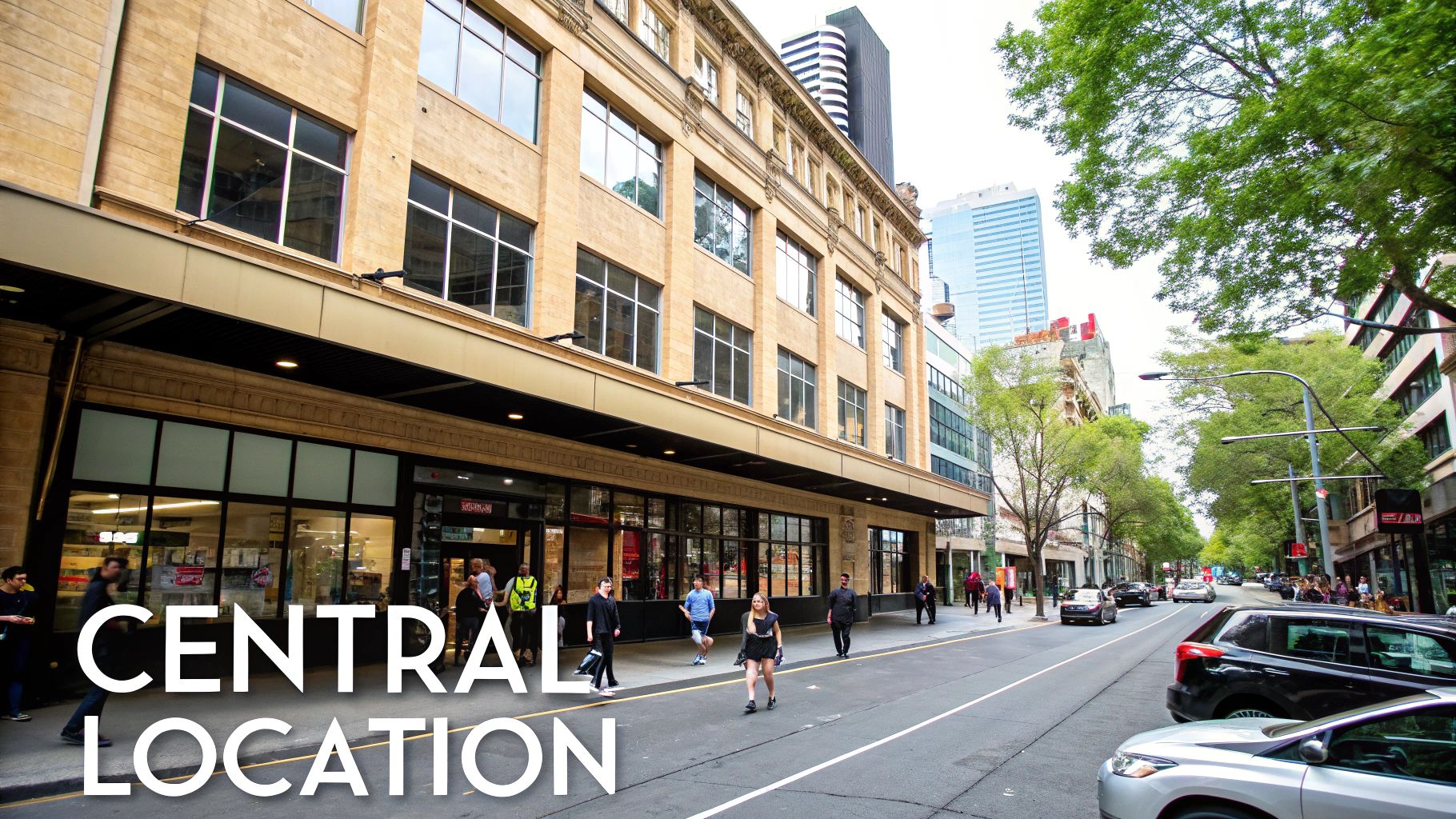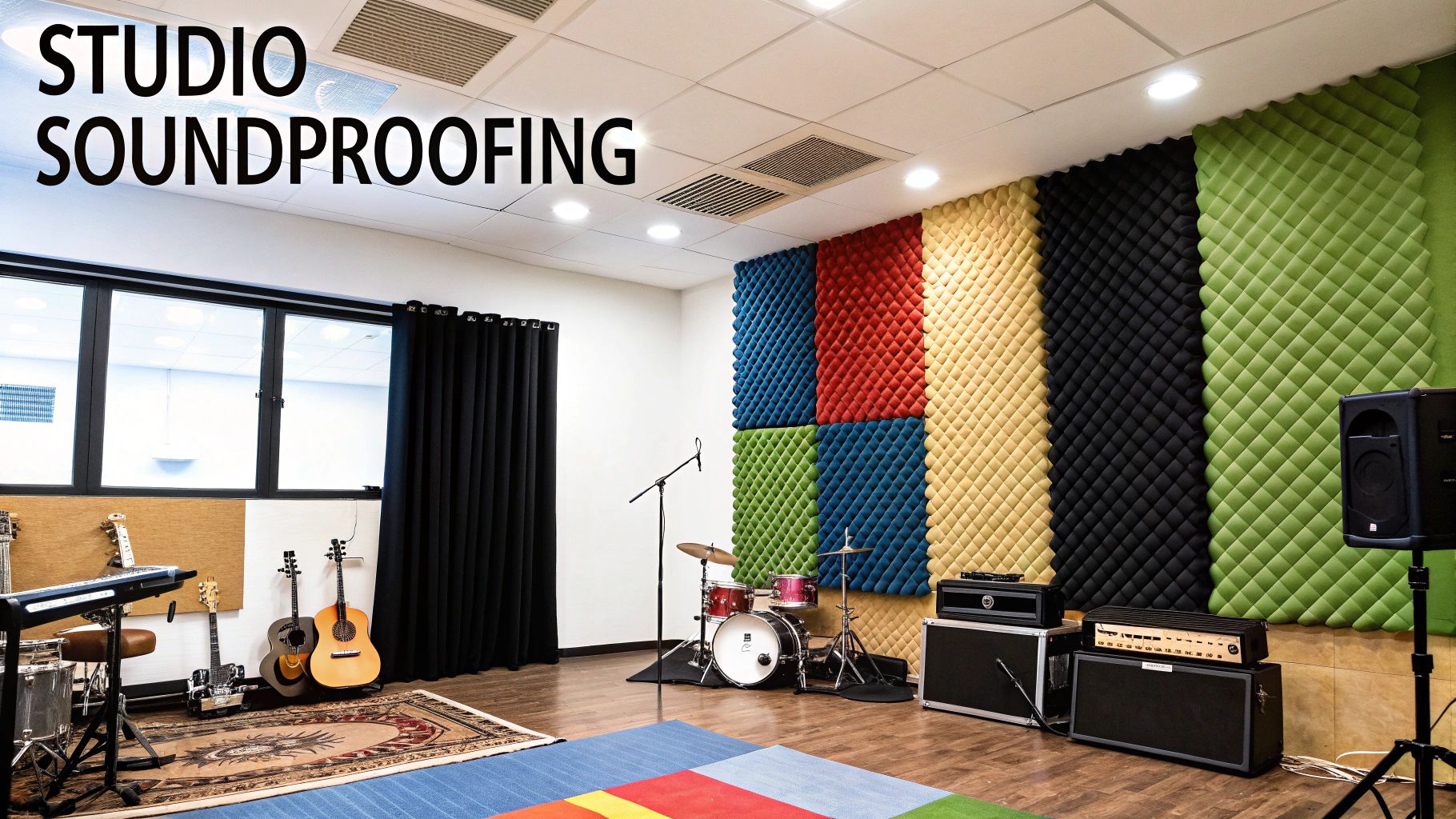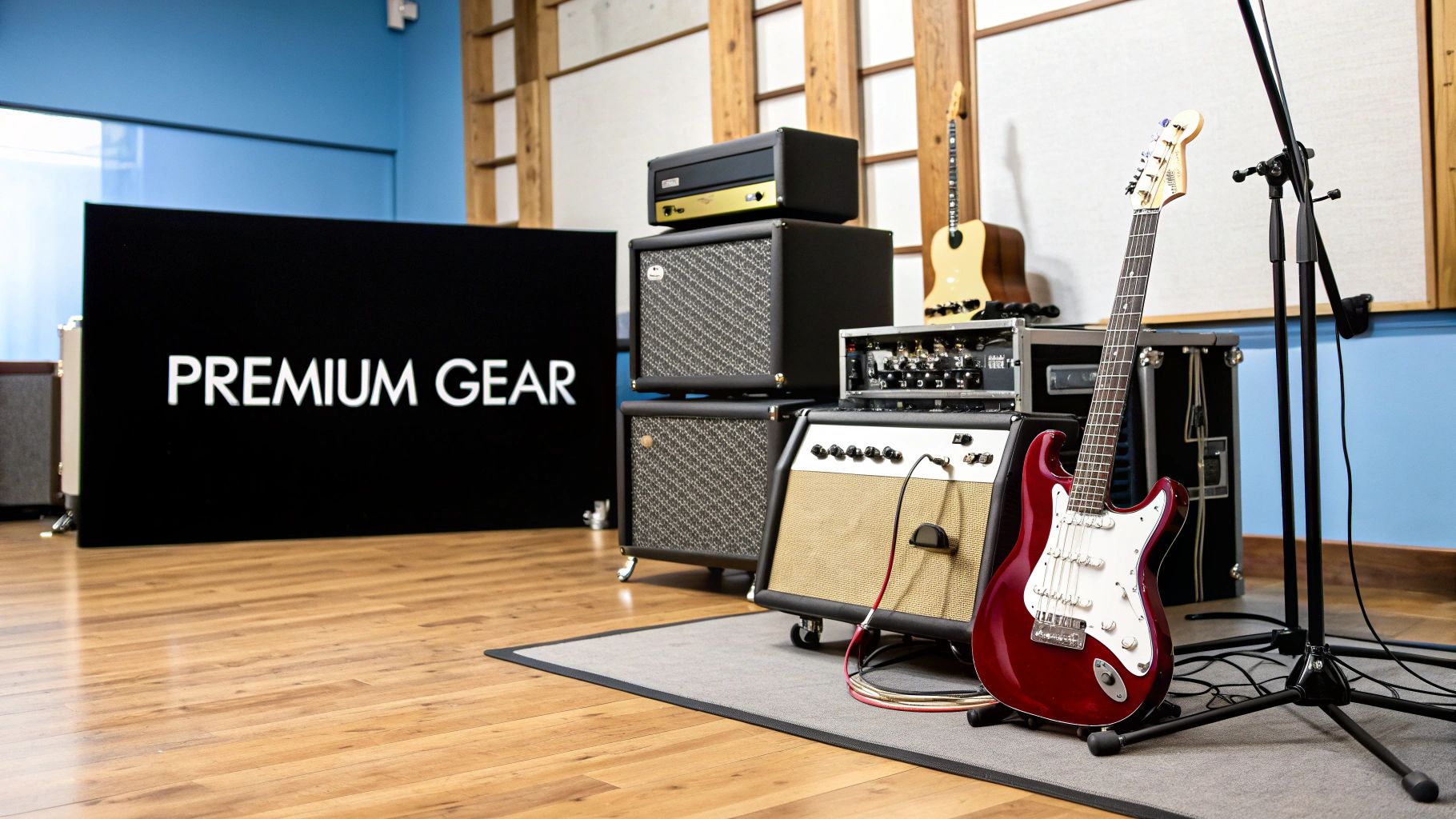Find the Best Music Rehearsal Space Melbourne | Guide & Tips
- contact733797
- Aug 9, 2025
- 11 min read
So, you're on the hunt for a music rehearsal space in Melbourne. Good news: this city is packed with options. But navigating the scene to find the right room for your band can be tricky if you don't know what to look for. Whether you're a new band needing a simple spot to jam or seasoned pros tightening a set for a big show, let's break down what you can expect.
What to Expect from Melbourne Rehearsal Studios
Melbourne’s music culture is legendary, and its rehearsal studios reflect that diversity. You’ll find everything from gritty, DIY spaces tucked away in creative pockets like Brunswick and Coburg to slick, acoustically perfect rooms in Southbank and Richmond. The vibe, gear, and amenities will vary wildly depending on where you land.
Most studios will have the basics covered, so you can just plug in and play. Typically, this means you'll get:
A decent PA system for vocals and backing tracks.
At least two microphones, complete with stands and leads.
A basic drum shell pack (but remember to bring your own cymbals, snare, and kick pedal – that's standard practice).

As you can see, the data backs this up. The vast majority of spaces come equipped with the gear you need to get a productive session underway without lugging your entire setup across town.
Understanding Costs and Locations
When you start looking around, you'll quickly see that price, location, and what’s included are all connected. A budget-friendly room might be a bit bare-bones, but it's perfect for a casual jam or a songwriting session. You'll often find these gems in outer suburbs like Thomastown or Carrum Downs.
On the flip side, premium studios or 24/7 lockout rooms in more central spots like South Melbourne or Docklands will cost you more. For the extra cash, you're paying for superior soundproofing, a better choice of backline (think specific amps or keyboards for hire), and perks like lounge areas or kitchenettes.
The energy in a youth orchestra rehearsal is a great reminder that music is about connection and passion. The best studios foster a similar vibe, where creativity feels encouraged and supported, not just accommodated.
To give you a clearer picture, here's a quick comparison of the different types of rehearsal studios you'll find across Melbourne.
Melbourne Rehearsal Space Options at a Glance
This table breaks down the common studio types to help you match your band's needs with the right space and budget.
Studio Type | Best For | Average Price Per Session | Common Locations |
|---|---|---|---|
Budget-Friendly | Songwriting, casual jams, bands on a tight budget. | $50 – $70 | Brunswick, Coburg, Footscray |
Mid-Range Standard | Regular band practice, pre-production, set prep. | $65 – $85 | Richmond, Collingwood, Preston |
Premium/Lockout | Professional bands, tour prep, long-term hire. | $80 – $100+ | South Melbourne, Docklands, CBD |
Finding the right fit often comes down to balancing your budget with your creative needs. Generally, you can expect to pay between $50 and $100 for a session, which usually gets you a 4- to 8-hour block. If you're curious about what's out there, you can explore a full directory of Melbourne studios and their specific rates to see what aligns with your budget.
Figure Out What Your Band Actually Needs
Before you even start Googling "music rehearsal space Melbourne," take a moment to figure out what you and your band really need. Trust me, jumping the gun and booking the first place you find is a classic rookie error. It often ends with a space that just doesn't work, wasting your time and hard-earned cash.
First things first, how many of you are there? It sounds obvious, but a solo artist has completely different needs than a five-piece band with a horn section. Think about your lineup and how much physical space each person—and their instrument—needs to function without tripping over each other. A cramped room is a surefire way to kill creativity and create a tense, unproductive vibe.

Next up: the backline. Are you happy to plug into whatever house gear is available, or is your sound tied to your specific equipment? Drummers, you know the drill—most studios provide the shells, but you'll almost always need to bring your own snare, cymbals, and kick pedal. If your guitarist can't live without their specific valve amp for that signature tone, you need to check if the studio has one to hire or if you'll be lugging your own.
What’s the Goal for This Rehearsal?
The why behind your session is just as important as the who and what. The type of rehearsal you're planning should directly shape your choice of room.
Writing and Arranging New Tunes: When you're in the early stages of crafting new songs, the vibe of the room is everything. You'll probably want a more relaxed, comfortable space where creativity can flow. It's less about sheer volume and more about having the mental space to experiment.
Nailing Down Parts for Pre-Production: If the goal is getting tight and locking in every part, you need a room with great acoustics. A quality PA system is non-negotiable here so you can hear every nuance and make sure everyone is perfectly in sync.
Practicing for a Gig: Got a show coming up? Then you need to rehearse at stage volume. This means finding a room with solid soundproofing that lets you crank the amps without holding back or getting noise complaints.
A writer at the Abbotsford Convent once mentioned how the space held "compelling, even ghostly, energies." You might not be searching for a haunted studio, but the energy of a room—whether it feels inspiring or sterile—absolutely makes a difference to the music you'll make.
Don't Forget the Boring (But Important) Stuff
Finally, think about the practical details that can make or break a session. How are people getting there? If some band members rely on public transport, is the studio easy to get to? For those driving, is there plenty of safe parking, especially if you're planning a late-night session?
If your schedule is all over the place, look for studios that offer 24-hour access for ultimate flexibility.
Nailing down these details—your people, your gear, your goals, and the logistics—before you start your search will make finding the right music rehearsal space in Melbourne a whole lot easier.
How to Choose the Right Rehearsal Studio

Alright, so you've mapped out what your band needs. Now comes the fun part: finding the perfect spot. Choosing the right music rehearsal space in Melbourne is about more than just the hourly rate. The little things are what make the difference between a frustrating jam and a genuinely productive session where everything just clicks.
Let's start with the gear. Most studios will say they have a "drum kit and amps," but that can mean anything. A touring band needs rock-solid, professional-grade gear that won't give out mid-solo. On the other hand, if you're a new band just finding your feet, a more basic setup might be all you need. Don't ever hesitate to ask for specifics on brands and models before you book.
Soundproofing and Room Acoustics
Next up, and this is a big one, is the room's sound. This really breaks down into two key things: soundproofing and acoustic treatment.
Soundproofing is what keeps your sound in and, just as importantly, keeps the band next door out. There's nothing more distracting than trying to lock in a delicate intro while a metal band is blasting through the walls.
Acoustic treatment, meanwhile, is all about how sound behaves inside the room. A well-treated space with things like bass traps and acoustic panels will sound clean and defined. You won't be fighting against a muddy, echoey mess, which means you can actually hear what everyone is playing and get your sound dialled in perfectly.
The vibe of a place can make or break a rehearsal. An inspiring, supportive room makes you want to create and experiment. A sterile, unwelcoming space can kill the creative energy before you even plug in your guitar.
Think about the community, too. Some facilities, especially around creative hubs like Yarraville, do a fantastic job of building a real community vibe. They offer a proper plug-and-play experience that genuinely helps artists. Places like Kindred Studios are a great example, offering rooms with full PA systems, mics, and even climate control as standard. It shows they care about the experience.
Thinking About Your Goals
What you need really comes down to what you're trying to achieve.
You're a new band just starting out. Your main focus is probably on finding somewhere affordable and easy to get to. A basic room with a decent PA system will let you work on your songs without emptying your pockets.
You're an established band prepping for a tour. You'll need a space that can handle stage volumes without issue. That means excellent soundproofing, gear you can rely on, and maybe even a place to store your own equipment between sessions.
In the end, the best rehearsal space is the one that fits your mission. When you look past the price tag and really consider the gear, the acoustics, and the overall atmosphere, you'll find a studio that helps you get the job done.
For a deeper dive, check out our guide on [finding the best rehearsal studio in Melbourne](https://www.thatcreativehub.au/post/finding-the-best-rehearsal-studio-melbourne) for more practical tips.
Getting to Grips with Studio Costs and Booking Policies
Let's talk money. When you're looking for a music rehearsal space in Melbourne, figuring out the costs can feel a bit like guesswork. It’s crucial to know what you’re actually paying for, because the price tag isn't just a random number. It’s a direct reflection of the room's size, the gear provided (the backline), and even the time of day you want to jam.
Most rehearsal rooms work on a few standard pricing models:
Hourly Rates: Great for a quick run-through or some solo practice.
Block Bookings: The classic 4-hour session. This is the sweet spot for most bands and usually works out cheaper per hour.
Full-Day Lockouts: The go-to for serious pre-production or tour rehearsals when you need to settle in and make the space your own for the day.

You’ll almost always find that prices change depending on whether you book a peak time (evenings and weekends) or an off-peak slot (weekday arvos). Naturally, a big room built for a 5-piece band will cost more than a cosy space designed for a singer-songwriter.
What You're Paying for at Premium Venues
So, why do some places charge more? It usually comes down to better facilities and prime locations. For example, professional venues in desirable spots like Southbank command higher prices because they offer top-tier features.
Take the Melbourne Opera Centre. Their hire fees can start from $30 per hour for a small room and climb all the way to $170 per hour for a massive studio that can fit 150 people. The daily rates follow suit, hitting up to $1,360 and often bundling in extras like a Green Room and cleaning fees. It's a different league, and you can see more on what these premium spaces offer.
My advice? Always ask the important questions before you hand over your card. "What's your cancellation policy?" is a big one. Another good one is, "Are there extra fees for hiring specific amps or cymbals?" A couple of quick questions can save you from a nasty surprise later on.
To avoid missing out, try to book popular evening or weekend slots at least a week ahead. If you find a space you really click with, it's worth asking about a permanent weekly booking. You’ll lock in your preferred time and might even score a better deal.
Nailing the booking is half the battle. For more tips on how to make sure your studio hire leads to a killer session, have a read of our [guide to music studio hire for flawless tracks](https://www.thatcreativehub.au/post/your-guide-to-music-studio-hire-for-flawless-tracks).
How to Make the Most of Your DIY Studio Experience
Right, so you’ve booked your music rehearsal space in Melbourne. Don’t just pat yourself on the back yet—that’s only half the job. Now you’ve got to make every minute of that paid time count. A killer rehearsal doesn't just happen by accident; it’s all about going in with a solid plan and the right attitude.
At That Creative Hub, we’re all about empowering you to create — whether you’re a seasoned pro or just starting out. Our spaces are designed to be plug-and-play, but we’re always here to support behind the scenes.
Before You Plug In
Before you even think about walking through the door, get your game plan sorted. What are the top three things your band absolutely needs to get done? Maybe you’re polishing a new track for a gig, figuring out that one tricky transition that keeps tripping you up, or just jamming on fresh ideas. Whatever it is, have it clear in your head.
Also, do a quick gear check. A simple message in the group chat—"Who’s bringing leads? Are we covered for mic stands?"—can save you from that classic, frustrating moment of wasting the first 30 minutes of your session because someone forgot something essential. We’ve all been there.
When the Clock is Ticking
Once you’re in the room, it's go time. You’ve got your plan, so try to stick to it, but don't be so rigid that you kill the vibe. If a song suddenly starts gelling and the energy is there, run with it. The real goal is to leave feeling like you’ve moved forward, not just ticked boxes on a list.
This is your chance to hear everything at stage volume, so use it. Crank it up and get a feel for how your set really sounds. Fine-tune your instrument levels and the overall mix.
Creative clashes? They’re inevitable. When they pop up, don't let them suck the air out of the room. A great trick is to just record a couple of takes of the different ideas on your phone. Listening back with fresh ears almost always makes the right path obvious.
Don’t be afraid to ask the studio staff for a hand. Seriously. They’re not just there to process your booking. These folks are usually audio nerds who love this stuff. If you’re fighting with a piece of gear or can't get the sound you want, they are your best resource.
That’s the kind of supportive vibe we’ve built at That Creative Hub. We designed our spaces to be simple plug-and-play setups, but we’re always here to help. We even act as a sort of creative concierge, connecting artists with the gear or people they need to make their project happen. You can see how we support creators like you and help bring visions to life.
Got Questions About Rehearsal Studios? We've Got Answers
Stepping into the world of rehearsal studios for the first time? It's totally normal to have a few questions. Knowing what to expect before you book your music rehearsal space in Melbourne means you can walk in, plug in, and get straight to creating without any guesswork.
Let’s get into some of the common things musicians ask.
What Gear is Actually Included?
This is probably the biggest question we get. You show up ready to make some noise, but what's actually waiting for you in the room?
Most professional studios will have the core essentials ready to go. Think a solid PA system for vocals, a couple of microphones with stands, and a basic drum kit shell pack (kick, toms). But here’s a pro tip: always assume you need to bring your own breakables for the drum kit. That means your favourite snare drum, your own cymbals, and a kick pedal if you're particular about it.
Guitar and bass amps are often available, but they might be an add-on hire. It's always a good idea to double-check when you book so you don't get any surprises.
How Far in Advance Should I Book?
Honestly, the sooner the better, especially if you're eyeing up those prime-time evening or weekend slots. A good rule of thumb is to book at least a week ahead. For really popular studios during busy periods, you might even need to lock in your time two weeks out to avoid disappointment. Spontaneous jam session? You can always try for a last-minute spot, but planning ahead is your best bet.
Is There a 'Studio Code' I Should Know About?
Once you're in the space, a little bit of common courtesy goes a long way. It’s not about strict rules, but more about respecting the shared creative environment.
Be punctual. Your booking has a start and an end time. Arriving on time and packing down before your session finishes is key.
Leave it as you found it. A quick tidy-up—wrapping cables, putting rubbish in the bin—is always appreciated.
Something broken? Let the staff know straight away. Accidents happen, and telling someone means it can be fixed for the next band.
Keep it down outside the room. Be mindful of other musicians working in adjacent studios.
It really just boils down to respect. Treating the gear, the space, and the people well ensures you’ll always be welcomed back and helps foster a great creative community for everyone.
Treating the studio right builds a great reputation for you and your band, making future bookings a breeze. If you've got more specific questions, we’ve put together a comprehensive list of answers on our [frequently asked questions page](https://www.thatcreativehub.au/faq-s).
Comments